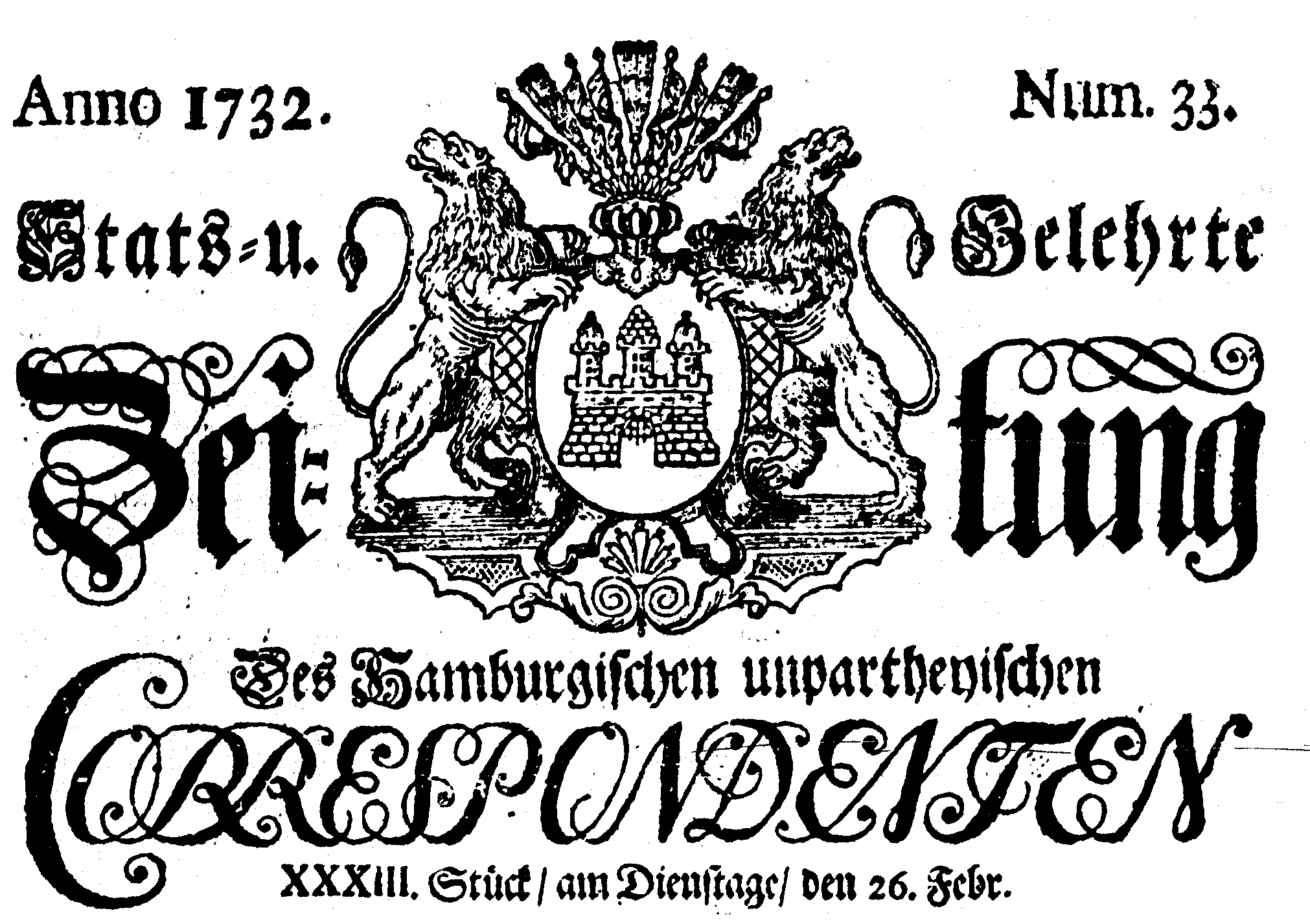Hamburgischer Correspondent on:
[Wikipedia]
[Google]
[Amazon]
 ''Hamburgischer Correspondent'' was the oldest political newspaper in the city of
''Hamburgischer Correspondent'' was the oldest political newspaper in the city of
Eckardt, Julius von
''
Hamburgischer correspondent
''
Hamburgischer Korrespondent
''Meyers Großes Konversations-Lexikon'' (1905) 1710 establishments in the Holy Roman Empire 1934 disestablishments in Germany Defunct newspapers published in Germany German-language newspapers Newspapers published in Hamburg Publications established in 1710 Publications disestablished in 1934 {{Germany-newspaper-stub
 ''Hamburgischer Correspondent'' was the oldest political newspaper in the city of
''Hamburgischer Correspondent'' was the oldest political newspaper in the city of Hamburg
(male), (female) en, Hamburger(s),
Hamburgian(s)
, timezone1 = Central (CET)
, utc_offset1 = +1
, timezone1_DST = Central (CEST)
, utc_offset1_DST = +2
, postal ...
in Germany
Germany,, officially the Federal Republic of Germany, is a country in Central Europe. It is the second most populous country in Europe after Russia, and the most populous member state of the European Union. Germany is situated betwe ...
. It was highly respected and often cited in newspapers of neighboring countries. It was politically slanted towards the government, national-liberal, but most of the time independent of any political party. The newspaper was published for more than 200 years, but closed down during the Nazi years.
History
Its history started in 1710 or 1711 when the book printer Holle in Schiffbeck near Hamburg published the ''Schiffbecker Posthorn'' twice weekly. Its name changed to ''Aviso'' and in 1721–1731 its title was ''Staats- und Gelehrte Zeitungen des holsteinischen unparteyischen Correspondenten''. After it was acquired by another book printer Georg Christian Grund, and moved to Hamburg, its name changed to ''Staats- und gelehrte Zeitung des Hamburgischen unparteyischen Correspondenten'' (State and scholarly newspaper of Hamburg's nonpartisan correspondents). During French rule in Hamburg, it was published with French and German text under the title ''Journal du département des Bouches de l'Elbe''. In the early 19th century it was the most widely distributed newspaper in the German language. It had a circulation of 30,000 copies (1806). In 1830 it became a daily newspaper and in the early 20th century it had 13 issues per week. Starting in 1852 it served as anofficial journal
A government gazette (also known as an official gazette, official journal, official newspaper, official monitor or official bulletin) is a periodical publication that has been authorised to publish public or legal notices. It is usually establis ...
for the city of Hamburg. In 1862 it merged with the trade journal ''Hamburgische Börsenhalle'' (founded in 1805), which continued to appear twice weekly. The newspaper was incorporated as a shareholder company in 1869.
During the Weimar Republic
The Weimar Republic (german: link=no, Weimarer Republik ), officially named the German Reich, was the government of Germany from 1918 to 1933, during which it was a constitutional federal republic for the first time in history; hence it is al ...
(1920s) the newspaper was affiliated with the national-liberal German People's Party
The German People's Party (German: , or DVP) was a liberal party during the Weimar Republic that was the successor to the National Liberal Party of the German Empire. A right-liberal, or conservative-liberal political party, it represented politi ...
(Deutsche Volkspartei, DVP). It did not sell as well as it used to, and it got into financial problems. After the Nazi rise to power (Machtübernahme
Adolf Hitler's rise to power began in the newly established Weimar Republic in September 1919 when Hitler joined the '' Deutsche Arbeiterpartei'' (DAP; German Workers' Party). He rose to a place of prominence in the early years of the party. Be ...
) and their suppression of the oppositional press, the termination of the financially troubled newspaper was accelerated. On 1 April 1934 it was acquired by the publisher Hermanns Erben and the newspaper merged with ''Hamburger Nachrichten
A hamburger, or simply burger, is a food consisting of fillings—usually a patty of ground meat, typically Ground beef, beef—placed inside a sliced bun or bread roll. Hamburgers are often served with cheese, lettuce, tomato, onion, pickles ...
''. Thus, the ''Hamburgischer Correspondent'' became the first non-socialist newspaper in Hamburg to close down during Nazi rule.
Editors in chief were Julius von Eckardt (1870–74),''
Nordisk familjebok
''Nordisk familjebok'' (, "Nordic Family Book") is a Swedish encyclopedia that was published in print from between 1876 and 1993, and that is now fully available in digital form via Project Runeberg at Linköping University. Despite their consi ...
'' (1907) in 1905 Hermann Diez and in 1924 Felix von Eckardt.
References
External links
Hamburgischer correspondent
''
Nordisk familjebok
''Nordisk familjebok'' (, "Nordic Family Book") is a Swedish encyclopedia that was published in print from between 1876 and 1993, and that is now fully available in digital form via Project Runeberg at Linköping University. Despite their consi ...
'' (1924)Hamburgischer Korrespondent
''Meyers Großes Konversations-Lexikon'' (1905) 1710 establishments in the Holy Roman Empire 1934 disestablishments in Germany Defunct newspapers published in Germany German-language newspapers Newspapers published in Hamburg Publications established in 1710 Publications disestablished in 1934 {{Germany-newspaper-stub